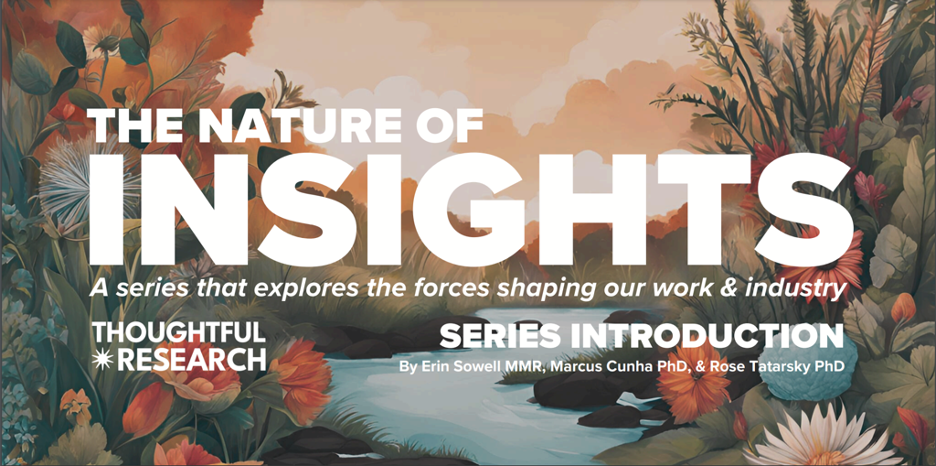The Nature of Insights: Series Introduction
The Nature of Insights is an article series that explores the forces that shape our work and industry.

Article series
The Nature of Insights
- The Nature of Insights: Series Introduction
- The Nature of Insights: Understanding Ecosystems
- The Nature of Insights: Optimizing Strategies
The nature of success is changing, and business is changing with it.
Success has always been the ultimate goal for leaders, brands, organizations, and even all living things. Deep within all of us lies an intrinsic motivation to succeed, and while definitions of success vary, at its core, it is about surviving and growing—finding a space where we can create value and meet our needs.
Success in business once followed a predictable path: identify an opportunity, outperform competitors, and dominate the market. This approach worked in slow-moving environments where incremental innovation was enough to maintain one’s position. Today, however, rapid technological advancements, shifting consumer behaviors, and global disruptions have created a complex landscape where change is the only constant.
Success now favors those who navigate change with agility and insight.
Leaders must go beyond traditional competition and adopt a dynamic approach that prioritizes learning, adaptation, and engineering. In this new paradigm, reacting to change is no longer enough—leaders must anticipate shifts, influence outcomes, and strategically position their work for lasting success.
However, leaders cannot achieve this on their own. Collaboration and a culture of continuous learning are vital. Success today requires more than tools and technology; it calls for a mindset that views change as an opportunity rather than a threat. Leaders who embrace this perspective can turn uncertainty into a competitive advantage and transform challenges into growth opportunities.
The Insights Industry plays a critical role in guiding businesses through this rapidly shifting landscape.
In times of rapid change, insights serve as a compass, helping leaders make sense of uncertainty and steer toward growth. A prime example is The New York Times, which used insights into reader behavior to shift from declining print model to digital leadership. By focusing on digital subscriptions, interactive content, and personalized experiences, The Times not only reinvented itself but also set a new standard for digital journalism. Former CEO Mark Thompson compared this transformation to navigating a “vast series of complicated weather systems crashing into one another,” illustrating the complexity of the change they faced (McKinsey & Company).
If insights are the compass, then insights professionals are the expert navigators, guiding leaders through the business landscape's complex and often uncharted territory. Like seasoned guides leading expeditions, we leverage our deep understanding of market dynamics to help leaders, brands, and organizations interpret shifting conditions and seize new opportunities. Our role goes beyond data interpretation—we illuminate pathways forward, empowering strategic decisions that drive success in an ever-evolving world.
For over a century, insights have evolved alongside businesses, adapting to meet the changing needs of business.
Once confined to formal research or executive intuition, insights now stem from diverse sources like big data, social media listening, and cross-functional collaboration. This growing integration of collective intelligence into decision-making processes is rapidly transforming the role of insights, shifting us from service providers to strategic partners, essential in shaping business strategy.
The Insights Maturity Model (IMM), developed by Boston Consulting Group, Cambiar, and Yale School of Management in 2015, illustrates this evolution with four stages of insights maturity:
Service Function: Providing reliable information.
Thought Partner: Interpreting data and acting as a sounding board.
Strategic Partner: Embedding insights in strategic decision-making.
Corporate Leader: Shaping culture, strategy, and innovation at the highest level.
Research shows that insights teams are progressing through these stages, with 35% now playing a strategic role—up from 20% in 2015—demonstrating our increasing influence on business success (2023 GRBN Business Maturity Study).
To become more strategic, insights teams need a compelling strategy and an effective way to deliver it.
Yet, many functions still struggle to make a meaningful strategic impact. The challenge lies in turning data into actionable insights, fostering cross-functional collaboration, and driving tangible business results. According to the 2023 GRBN Business Maturity Study, advancing maturity requires teams to synthesize complex data, sharpen consultative skills, strengthen relationships, and clearly communicate our value.
To address these challenges, insights teams must adopt a streamlined approach that blends traditional research with strategic application. As navigators in a fast-changing landscape, we need tools that not only help us understand our environment but also convert insights into actionable strategies. With the right frameworks and technology, teams can simplify decision-making and enhance collaboration across functions to create lasting impact.
Ecosystem science provides a powerful framework for navigating today’s complex, interconnected business landscape.
Ecosystem science studies the interactions and dynamics within networks and environments, showing how individuals and organizations compete, collaborate, and navigate complex systems. By applying its concepts, theories, and models, businesses can gain valuable insights into how organizations, industries, and markets function, adapt to change, and uncover new opportunities for growth. This science sheds light on the invisible forces of the market, illustrating how consumers and producers create value and build relationships.
These insights equip leaders and insights professionals with tools to guide strategic decision-making and foster collaboration. At its highest potential, ecosystem science can underpin technologies that function like a GPS—scanning market forces, forecasting challenges, and recommending real-time adjustments. While we wait for advanced solutions to emerge, its principles can be applied through frameworks that transform complex data into meaningful actions.
By embracing the principles of ecosystem science, The Insights Industry can enhance its strategic thinking and create immediate impact.
Thoughtful Research has distilled the principles of ecosystem science into The TRANSFORM: Framework™, which guides leaders through three essential steps:
Learn: Understand Your Ecosystem
Leaders need to view their surroundings through an Ecosystem Lens to identify the key elements, interactions, and dynamics that influence their organizations, industries, and markets. This perspective enables them to anticipate shifts and uncover new opportunities.
Adapt: Optimize Your Strategies
In today’s fast-paced world, adaptation is essential. Leaders must recognize shifting conditions, assess their impact, and adjust strategies to increase value. Agility enables leaders to proactively position themselves for immediate success.
Engineer: Secure Your Success
Beyond adaptation, leaders must actively shape their environment to ensure long-term success. By applying transformative strategies, they can engineer their ecosystems, elevate their positions, and establish themselves as essential players.
We will explore each of these principles in the next three articles.
The Insights Industry is uniquely positioned to help leaders understand their ecosystems, optimize their strategies, and secure their success.
With a cross-industry and cross-functional vantage point, we can identify patterns and trends others may miss, offering a broad, strategic perspective. We don’t just deliver data—we serve as trusted advisors, translating insights into actionable strategies that empower leaders to navigate complex landscapes and shape the future of their organizations, industries, and markets.
To fully realize this potential, insights professionals must embrace approaches that enhance our impact. Ecosystem science is at the core of this transformation. By applying its principles, we can synthesize complex data, sharpen consultative skills, and foster collaboration—making our strategic value undeniable. Ecosystem science equips us with the frameworks and technology to turn complexity into clarity, enabling leaders to learn from their environments, adapt to shifting dynamics, and engineer solutions for lasting success. As we guide leaders, brands, and organizations through their ecosystems, leveraging these principles is essential to both our success and that of our clients.
This is more than our role—it’s the nature of insights.
Join us as we explore the principles of ecosystem science in the upcoming articles of "The Nature of Insights" series.
In our next article, Understanding Ecosystems, we’ll uncover the hidden dynamics that shape today’s business landscape and show you how to view your organization, industry, and market through an Ecosystem Lens. By adopting this perspective, you’ll gain deeper insights into the forces at work so you can anticipate shifts and strategically position your work for success in a rapidly-changing environment.
Want to learn more? Watch our TEDx Talk, where we dive into the principles of ecosystem science and introduce The TRANSFORM: Framework™.
Secure Your Success With Ecosystem Science | Erin Sowell | TEDxUGA
Erin Sowell MMR
Researcher, Consultant, & Founder at Thoughtful ResearchErin Sowell is a researcher and consultant who applies ecosystem science to business and marketing. She is the founder of Thoughtful Research, an insights consultancy that helps leaders, brands, and organizations navigate rapidly changing markets and business environments. Prior to Thoughtful Research, Erin was an Associate Manager of Innovation Insights at Georgia Pacific and Research Manager at Kroger's Retail Data Science, Insights, & Media Company, 84.51°. Before entering the Insights Industry, Erin represented the World Corrosion Organization at the United Nations. Erin received her Master of Marketing Research from the Terry College of Business at the University of Georgia and her B.S. in Earth and Environmental Science from Lehigh University.
Rose Tatarsky PhD
Science Communications Consultant at Thoughtful ResearchRose Tatarsky, PhD, is a research scientist specialized in neurobiology and animal behavior. Her work focuses on the neural and genetic mechanisms driving natural behaviors within the context of an animal's environment and evolutionary history. She earned her doctorate from Cornell University in 2022 and currently holds a postdoctoral research position at the Paris-Saclay Institute of Neuroscience. In 2023, Rose joined Thoughtful Research as a Science Communications Consultant, inspired by engaging conversations with Erin about the strategic use of ecosystem science in business & marketing contexts.
Marcus Cunha Jr. PhD
Partner at Thoughtful Research, Marketing Professor at University of GeorgiaMarcus Cunha Jr. is the Robert O Arnold Professor of Marketing at the University of Georgia (UGA) and the Director of the UGA’s Master of Marketing Research (MMR) program. His research focuses on cognition, judgment, and decision-making as applied to understanding issues in pricing and branding. Dr. Cunha’s research has been published in premier research journals such as the Journal of Consumer Research, Journal of Marketing Research, Marketing Science, and Journal of Marketing. He teaches MBA, MMR, and PhD students at UGA. He was awarded the college wide Outstanding Faculty Award for Teaching Excellence and the Hugh O. Nourse outstanding MBA teacher award by the Terry College of Business. Dr. Cunha also teaches the topics of statistical analysis, consumer behavior, behavioral economics, and media effectiveness research to large corporations such as Chick-fil-A, Lowe's, and Assurant, the Georgia Banking Association, and the Advanced School of Marketing Research (American Marketing Association). He has conducted consulting projects for multinational corporations both in the USA and in Brazil and has trained research executives in both countries.
Article series
The Nature of Insights
- The Nature of Insights: Series Introduction
- The Nature of Insights: Understanding Ecosystems
- The Nature of Insights: Optimizing Strategies


